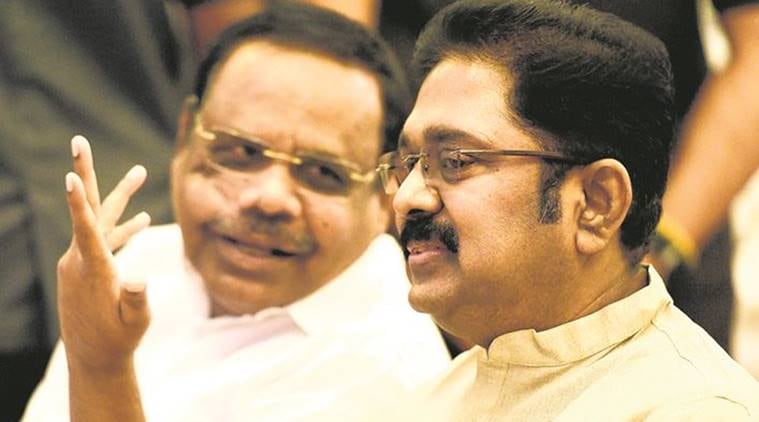Stay updated with the latest - Click here to follow us on Instagram
When the Speaker can judge if MLAs gave up their party membership ‘voluntarily’
Constitutional rules for conduct of MLAs outside the assembly came into play in Tamil Nadu
 Tamil Nadu assembly Speaker P Dhanapal (left) with T T V Dinakaran, from whose camp he suspended 18 MLAs Monday
Tamil Nadu assembly Speaker P Dhanapal (left) with T T V Dinakaran, from whose camp he suspended 18 MLAs Monday
The disqualification of 18 AIADMK MLAs loyal to T T V Dinakaran by Tamil Nadu Speaker P Dhanapal highlights, once again, the wide powers conferred upon presiding officers under the Tenth Schedule [Articles 102(2) and 191(2)] of the Constitution. It allows “a member of a House belonging to any political party” to be disqualified “if he has voluntarily given up his membership of such political party; or (b) if he votes or abstains from voting in such House contrary to any direction issued by the political party to which he belongs…”
The second provision, limiting the scope of the anti-defection legislation to voting, leaves the presiding officers with no discretion, for voting is a matter of record. However, the first provision brings into the picture the conduct of a member outside the House too. Tamil Nadu assembly secretary K Boopathy told The Indian Express that the Speaker had invoked “The Members of the Tamil Nadu Legislative Assembly (Disqualification Ground of Defection) Rules, 1986” to unseat the MLAs. He said chief government whip S Rajendran had petitioned the Speaker to disqualify these members for anti-party activities. The Speaker, he maintained, had issued notices to all of them but they had not appeared before him.
According to Subhash Kashyap and P D T Achary, both former secretaries-general of Lok Sabha, the Speaker of the House had to examine the conduct of a member against whom a complaint had been made. He had to see whether it was tantamount to his having “voluntarily” given up the membership of the party. They said in the present case, it was obviously so in the view of the Speaker.
Read | Tamil Nadu Speaker P Dhanapal sacks 18 T T V Dinakaran MLAs
Though the verdict of the Speaker had an element of finality, this was by no means the end of the road for the rebel AIADMK members. Kashyap pointed out that the “Tamil Nadu Speaker has exercised his powers as a judicial tribunal, and therefore, his decision is open to a judicial review”. “The appeal lies in Tamil Nadu High Court,” he said, adding that the latter “will determine the validity of the Speaker’s decision”.
Achary noted, however, that it was not the first time the matter would be looked into by a court. There were several examples of courts upholding the presiding officers’ interpretation of the conduct of members as having “voluntarily” quit the party on whose tickets they had been elected. Achary said in the present instance, the 18 AIADMK members were clearly indulging in an ant—party activity by publicly seeking the resignation of their own party chief minister, alongside members of Opposition parties.
Asked if it was ethically correct on the part of the Speaker to disqualify members before a head-count in the assembly while they were seeking a vote of confidence, a former Lok Sabha secretary-general, requesting anonymity, highlighted a crucial point. He sought to know if any such task (a vote of confidence) was pending with the Speaker. “When there was no such business outstanding with him, how can he be faulted for disposing of a petition against the AIADMK members?” the former secretary-general said.
Last month, Tamil Nadu Governor Ch Vidyasagar Rao had expressed his inability to intervene in the political crisis concerning the AIADMK, saying the rebel MLAs “continue to be AIADMK members”. He had reportedly told leaders of Opposition parties, when they had met him to seek his direction to the chief minister to obtain a vote of confidence, that “he will not interfere [in the matter] as the [rebel] AIADMK members haven’t been expelled from the party or joined another party.” It is over to Tamil Nadu High Court now.







